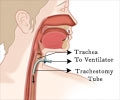Tracheostomy - Faqs
1. Which doctor performs tracheostomy?An ENT specialist surgeon is the doctor who performs tracheostomy.
2. How painful was the surgery?
There is very little pain immediately after the surgery that could be compared to a moderate headache.
3. What kind of anaesthesia do they use for the surgery?
The trach surgery is generally done under local anaesthesia but sometimes it is done under general anaesthesia.
4. How long does it take to heal?
It depends on the reason for which the procedure is being undertaken. If it were for simple obstruction or simple causes like 'sleep apnoea' then it generally would heal in about 7 days after the surgery.
5. What do you have to do to care for the tracheostomy tube?
After the surgery the area around tube has to be cleaned with gauze dipped in hydrogen peroxide. The tube would have to be suctioned whenever it becomes clogged.
6. Why is suctioning of a tracheostomy tube needed?
Having a tracheostomy tube increases the production of mucus in a patient and a decreases their ability to be able to cough out the mucus. Hence suctioning helps in getting rid of the blockage and marinating the proper airflow.
The person usually communicates, but in people who don't and in infants there are a number of signs one can look for that may indicate the need to be suctioned.
- Noisy breathing (a rattling or the sound of mucus bubbling)
- Rate of breathing increases
- The person appears uncomfortable, fussy, agitated or restless
- Inadequate chest movement upon inhalation
- Nasal flaring
- Infant has difficulty sucking
- Mucus can be seen bubbling at the tube opening
- Non-productive cough
- Blue colour around the lips, mouth or fingernails (cyanosis)
8. Can a suit with a tie be worn during the day?
No ties should be worn as the tube could get pushed back in.
9. Does the voice change in terms of clarity or loudness?
The voice usually does not change.









